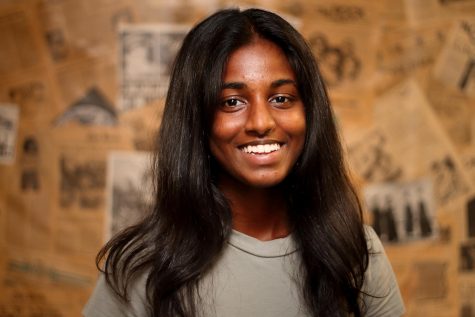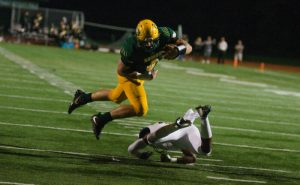Army Ants compete at world robotics championships after two-year COVID-19-related cancellations
April 29, 2022
The Army Ants, a For Inspiration and Recognition of Science and Technology (FIRST) Robotics Competition team based in Columbia and open to members from the three Columbia Public Schools high schools and home-schooled students, competed in the 2022 FIRST World Championships in Houston, Texas Wednesday, April 20 through Saturday, April 23. Prior to the championships, the team took part in the Oklahoma Regional competition in Shawnee, Oklahoma and the St. Louis Regional competition in St. Louis, Missouri in March and April. The team qualified for the Houston event by winning the Chairman’s Award at the St. Louis Regional, the most prestigious honor offered by FIRST for the team that inspires interest and respect for science, technology, engineering and mathematics, especially in youth, and largely through outreach measures.
Applying for the Chairman’s Award involves writing a 10,000 character essay, multiple 500-word executive summaries, an in-person interview in front of a panel of judges and a video submission played only if the team is granted the award.
Although multiple members of the Army Ants contributed to the essay, executive summaries and video, only three students on the team were allowed to present to and interact with the judges during the interview.
Junior Jill Patel was one of the three presenters for the Army Ants, and said although the experience was overwhelming, she was grateful the work of her and the other presenters, junior Caroline Ma—who led the Chairman’s Award group—and junior Yogev Angelovici, resulted in success.
“I honestly almost cried [. . .] it made me feel like I put my part into the team since it’s just my first year on the team, so I was clueless most of the time,” Patel said. “I was especially happy that [Ma’s] work and [the] hours she put into preparing [were] pulled off.”
Winning the Chairman’s Award at a regional competition is just one of the ways to qualify for the world championships. Other methods include winning the Engineering Inspiration Award, given to a team for demonstrating inventive and measurable ways to recruit students into the field of engineering, or winning the regional itself through a series of playoff matches against other teams’ robots. Co-chief mentor of the Army Ants, Dr. Anand Chandrasekhar, said because of the limited opportunities to make it to Houston and the vast number of teams vying for a chance, this year’s success is something he and the team will cherish.
“Only very few teams get to experience going to worlds,” Chandrasekhar said. “Although we like to talk about it as something we would like to go to every year, it is a very tough thing. Even very strong teams don’t get to go to worlds because there are so many variables and regionals. If things just don’t fall in the right place in the right way, your team may not be selected. It was just absolutely fantastic and almost unbelievable news because this is a very hard thing to happen.”
2022 was the first time the championships were held since 2019. Because of the COVID-19 pandemic restricting in-person contact and long-distance traveling, the event was canceled the past two years. In 2020, teams were forced to put their robots to rest in March, after close to 11 weeks of working on them, when the first COVID-19 wave hit. While FIRST offered an alternate series of innovative, at-home challenges in 2021 using each of the teams’ previous year’s robots, the competition was still unlike regular robotics seasons. Dr. Andy Winslow, a programming and co-chief mentor for the Army Ants, said the two-year gap impacted the amount of training new students had and put pressure on veteran team members.

“We didn’t have the level of preparedness that our team would normally be at. In a normal season, our juniors and our sophomores would’ve already had some experience building robots and doing [computer-aided design (CAD)], or working in the [machine] shop or programming the robots, and that was missing this year. Pretty much just the seniors and a few of the juniors had any true experience with the robots,” Winslow said. “But we weren’t the only team experiencing that, I mean, every single team out there was experiencing the exact same thing. So we were on equal footing with that, but it was certainly a challenge that we had to [face]. We did a great job in the pre-season training within the three core departments—[CAD, fabrication and programming]—the team has, and I’m proud of them for that.”
Despite not going on the Houston trip, Chandrasekhar was present for most of the build season, which occurred January through March. He mentioned similar concerns as Winslow regarding the team’s ability to work together after over a year of absence. As build season progressed, however, he said he was pleasantly surprised to see the process moving smoothly.
“It was probably a combination of the leadership, the training the students did during pre-season and good communication between the students. Maybe also the nature of the robot. In my opinion, I think it was a less complicated robot than we’ve had in the past. It really only needed to do two things: climb and shoot. We actually did both [functions] quite well,” Chandrasekhar said. “So maybe a variety of factors contributed to the team working quite well together [which] prevented us from running into any challenges I thought we’d run into”

One of the leaders of the team, senior Zihao Zhou, took on the role of vice-captain this year. A four-year member of the Army Ants, Zhou said he embraced his vice-captaincy during the months of preparation, and even more so at all three competitions, where he was a member of the five-person drive team, which monitors and controls the robot during matches.
“Although I had a lot of fun and gained a lot of experience through the online events during COVID-19, it definitely feels great to have the opportunity to go through the whole robot building process again,” Zhou said. “I missed the time we spent together as part of a team, working together to create new innovative features on our robot.”
Although Zhou will graduate this year, Patel, a rising senior, said she can and will participate for one more season. She expressed excitement for the future after the team’s experience working with other groups, clubs and organizations from across the globe in Houston.
“My favorite part was just getting to spend time with my team. Trips like these make it so easy to get along with people and get to know them better,” Patel said. “Sharing experiences, especially ones where everyone’s working hard towards the same goal, brings everyone closer. Teamwork makes the dream work or something like that.”
What are some activities you have rejoined after COVID-19 cancellations? Let us know in the comments below.


















































































